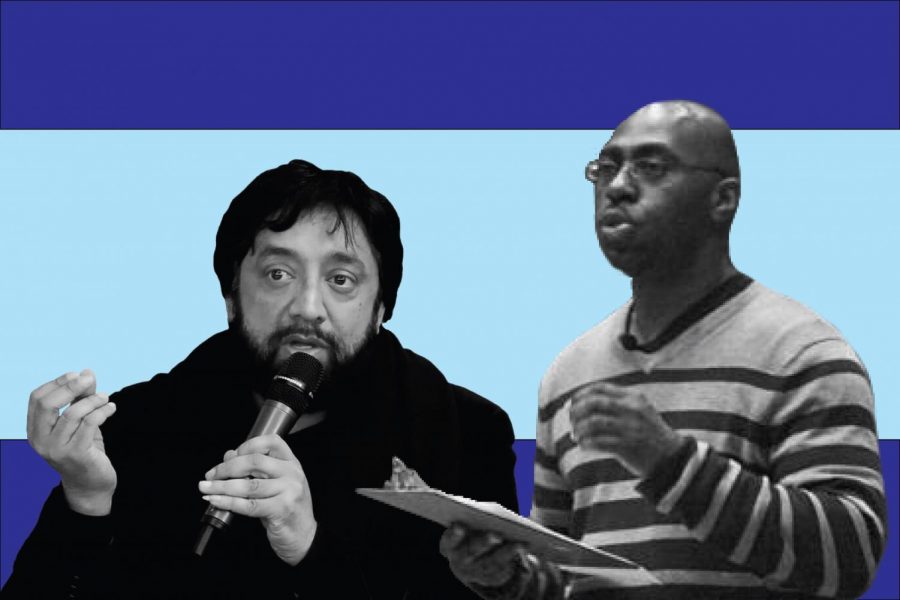Professors discuss institutional and gendered Islamophobia
Sayyid and Hesse say they have been friends and colleagues for over 20 years, working on and discussing these types of issues.
November 18, 2020
Salman Sayyid, professor of Social Theory and Decolonial Thought at the University of Leeds spoke with African American Studies Prof. Barnor Hesse in a Tuesday webinar hosted by the Buffett Institute for Global Affairs about Islamophobia as a form of racism, rather than religious discrimination.
Kellogg Prof. Klaus Weber introduced the speakers who discussed the institutional and gendered dimensions of Islamophobia. Following the speaker portion of the event, Weber took questions from the audience.
As Sayyid and Hesse discussed the misunderstanding of Islamophobia as religious rather than racial hate, Hesse said this misconception has led Islamophobia to become acceptable and commonplace in society.
“Islamophobia is a type of racism that targets the expression of Muslimness, or perceived Muslimness,” he said, referencing an infographic on Islamophobia co-created by Sayyid.
Similar to anti-Blackness or other commonly recognized forms of racism, Islamophobia stems from prejudice against observable characteristics, Sayyid and Hesse said. Critiques of the Quran and Islam are often merely justifications for the racism against non-White people with physical features that lead them to be stereotyped as Muslim, regardless of their religion.
“The first person who was killed in the United States in response to 9/11 wasn’t a Muslim,” Sayyid said. “He happened to be a bearded man with a turban. It was because he seemed to be a Muslim. No one asked him what he believed or what he did not believe in. It was simply a certain kind of assumption about certain kinds of markers.”
Muslim women also are often the victims of street violence based on their appearance and presentation, Hesse said.
Sayyid said this is because of an ideology of White and Western superiority where the West is seen as a champion of personal freedom and women’s rights, which is challenged when a Muslim woman walks down the street wearing her hijab.
“I would argue that (violence against Muslim-appearing women) is trying to restore a certain sense of homogeneity, a certain sense of Whiteness… which these women seem to be interrupting around that progressive narrative,” he said.
Weber discussed the need to address this harmful ideology of the supremacy of White ideas in politics and culture.
“If there is this idea that White sovereignty is what defines the legitimacy of the political experience then you begin to see the prohibition of Muslims, the prohibition of Blackness, the prohibition of Asianness and so on… We have to get to the roots (of) how the very idea of what we’ll call political life is actually constituted,” Weber said.
One can see this same sort of violence in public spaces where White ideals of appearance operate against Black people, who make up a significant population of Muslims, Hesse said.
Sayyid described how narratives of White saviorism within settler colonialism have bolstered racially motivated violence against Muslim women. Sayyid said that racism and Islamophobia are not separate entities from colonialism but that they are manifestations of colonialism in a domestic space.
“Imperialism has been justified as trying to rescue brown women,” Sayyid said. “The real issue is the notion that women, Muslim women, do not have agency, which predicates the necessity for this external intervention. Here the ‘savior’ comes in to provide agency.”
Sayyid closed out the discussion by addressing how to begin combating Islamophobia moving forward.
“One of the best ways to counter it is to expand the kind of framework by which the standard Muslimness is represented,” he said. “Asserting the possibility of those who are subjugated populations to have agency, and to be able to exercise that agency to be part of the conversation… including them and their concerns within the spectrum of how you think of your community in the future.”
Email: [email protected]
Twitter: @WKlunk
Related Stories:


